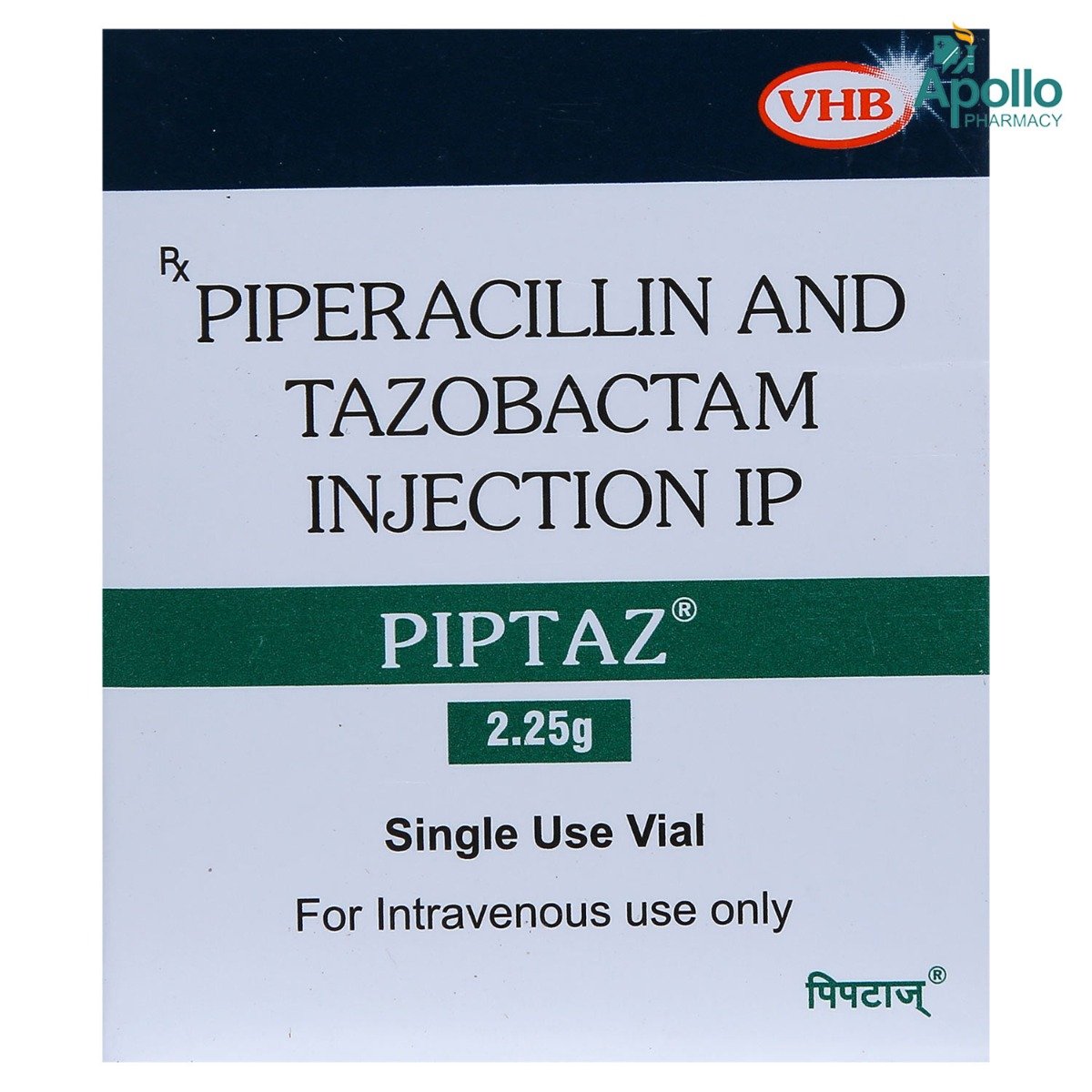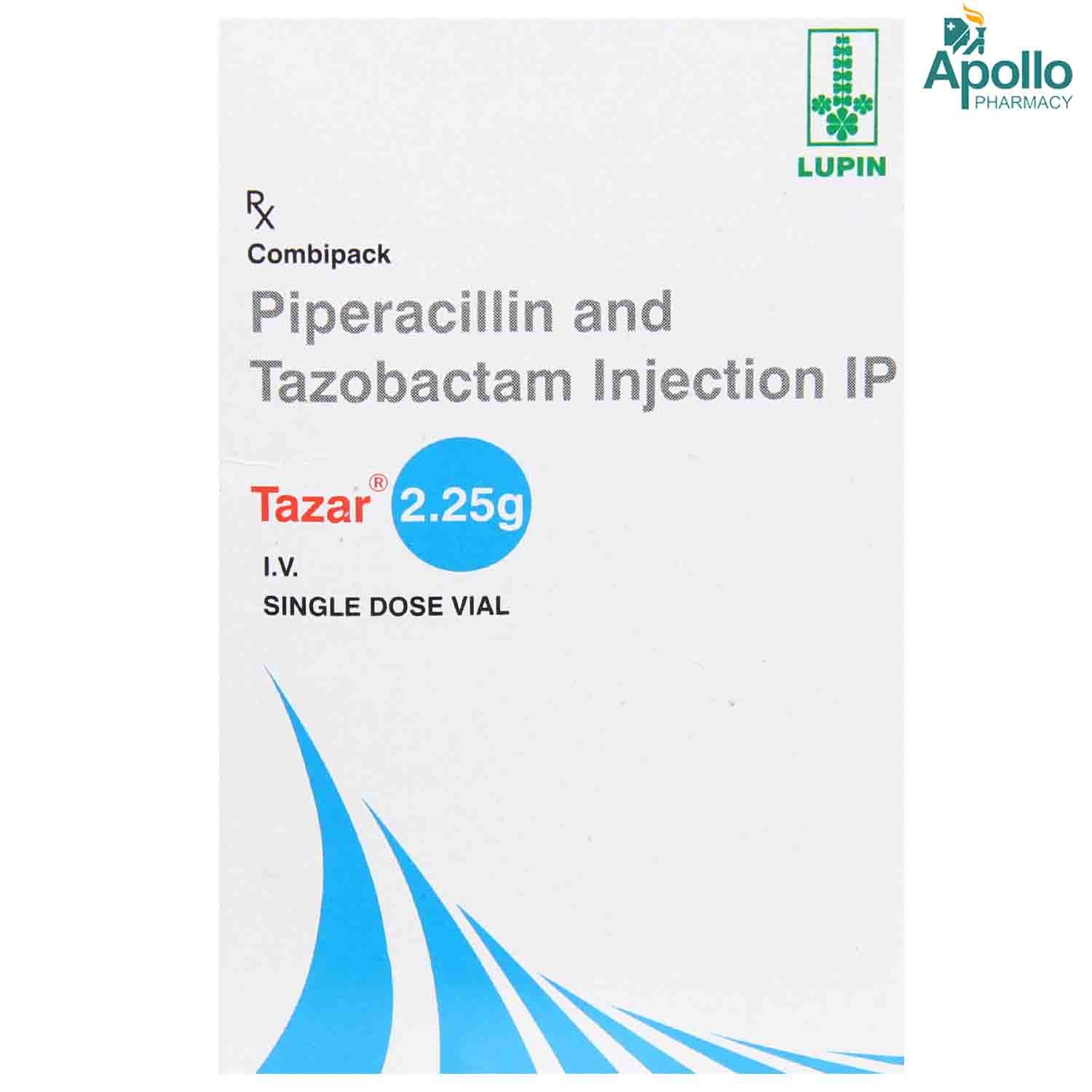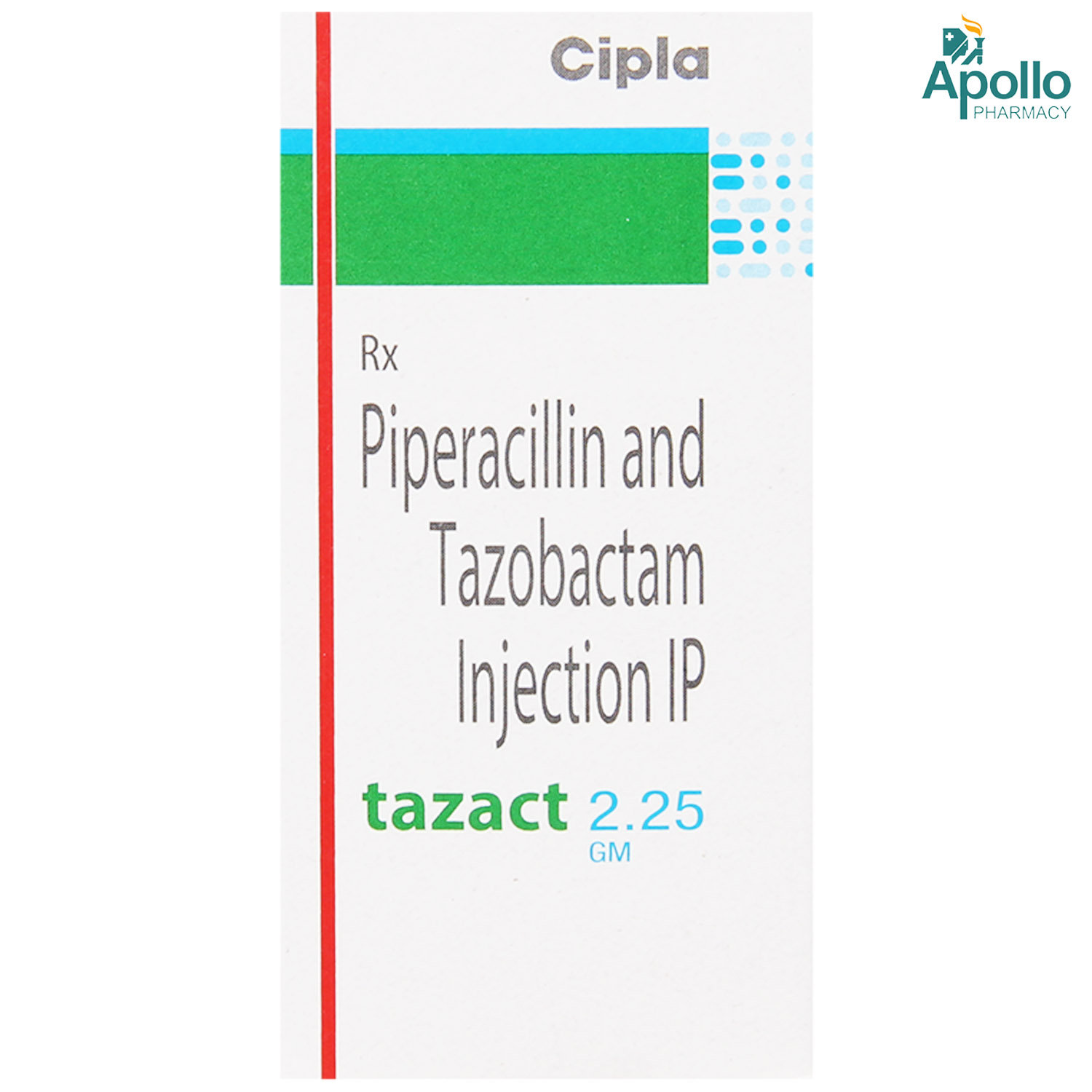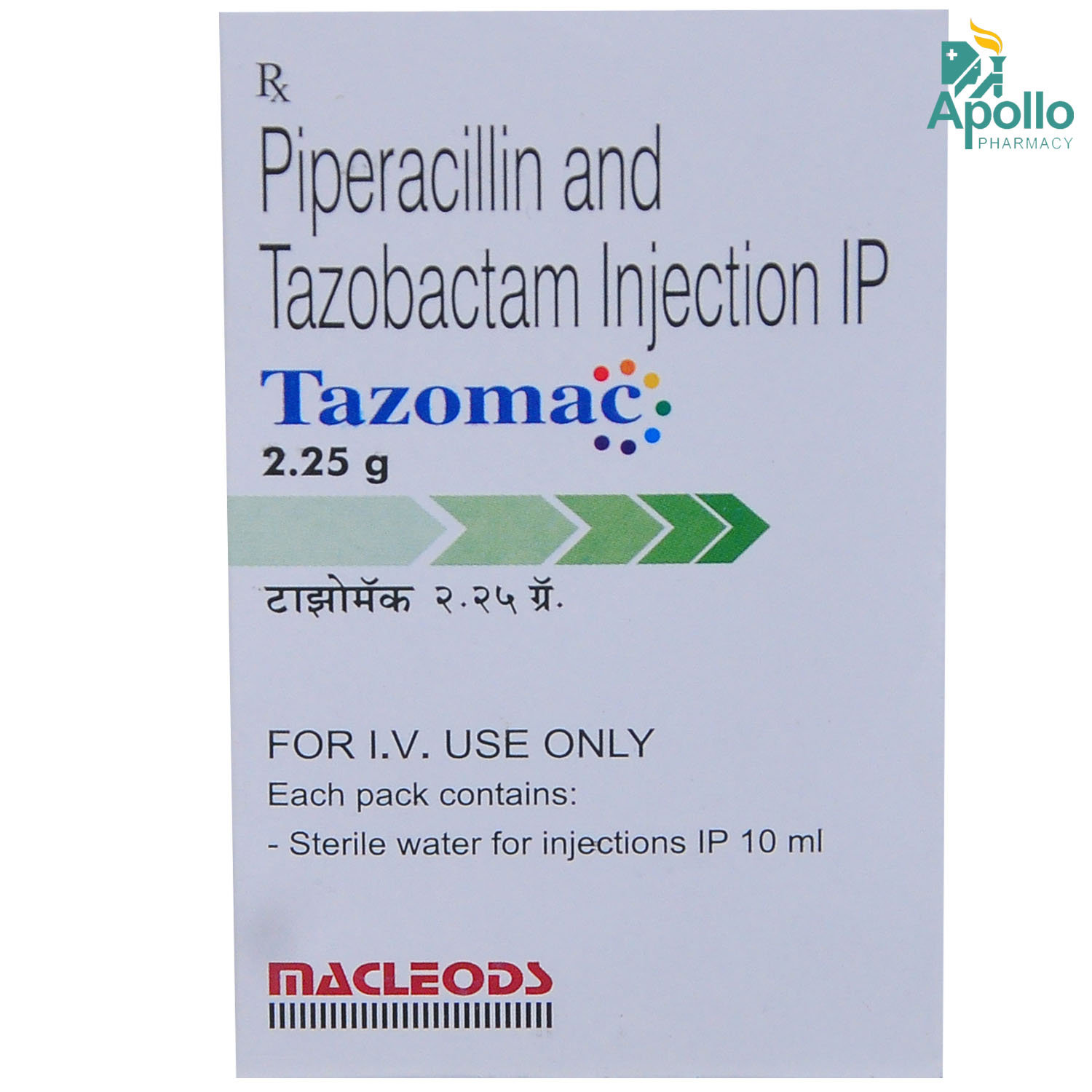Piptal 2.25 gm Injection 1's
MRP ₹191
(Inclusive of all Taxes)
₹28.6 Cashback (15%)
Provide Delivery Location
Online payment accepted
 Prescription drug
Prescription drugWhats That
Composition :
Manufacturer/Marketer :
Consume Type :
Expires on or after :
Return Policy :
About Piptal 2.25 gm Injection
Piptal 2.25 gm Injection belongs to the 'Antibiotics' class of drugs, primarily used to treat bacterial infections. It is used to treat various hospital-acquired and ventilator-associated pneumonia, urinary tract infections, intra-abdominal infections, skin and soft tissue infections (like diabetic foot infections) and uterine infections. Bacterial infection occurs when harmful bacteria grow in the body and causes illness. It can infect any part of the body and multiply very quickly.
Piptal 2.25 gm Injection contains two medicines, namely: Piperacillin (Penicillin antibiotic) and Tazobactam (beta-lactamase inhibitor). Piperacillin belongs to the class of 'Penicillin antibiotics.' It has bactericidal (ability to kill bacteria) activity against gram-positive and gram-negative aerobic (requires oxygen to survive) and anaerobic (survives with little or no oxygen) bacteria. Piperacillin acts by binding to the penicillin-binding proteins (PBPs) inside the bacterial cell wall and inhibits its cell wall synthesis. Tazobactam is a beta-lactamase inhibitor. Beta-lactamases are the enzymes produced by bacteria to gain multi-resistance to β-lactam antibiotics, such as penicillins and cephalosporins. Tazobactam prevents the breakdown of other antibiotics by beta-lactamase enzyme-producing organisms. In Piptal 2.25 gm Injection, Tazobactam works by preventing bacteria from destroying Piperacillin.
Piptal 2.25 gm Injection will be administered by a healthcare professional. Like all medicines, Piptal 2.25 gm Injection also causes side effects, although not everybody gets them. Common side effects of Piptal 2.25 gm Injection include nausea, constipation, diarrhoea, headache, and trouble sleeping. If any of these effects persist or worsen, seek medical advice promptly.
Brief your medical history to the doctor if you have any allergic reactions to antibiotics. Please inform your doctor if you have any liver, kidney diseases, bleeding disorders, and fits before using Piptal 2.25 gm Injection. Do not use Piptal 2.25 gm Injection while having vaccinations with live bacterial vaccines (typhoid vaccine) since Piptal 2.25 gm Injection may affect vaccines' activity. Piptal 2.25 gm Injection should be used during pregnancy only if the doctor advises you. It is also excreted into breast milk in small amounts. Hence, it is recommended to consult your doctor if you are pregnant or breastfeeding before taking Piptal 2.25 gm Injection.
Uses of Piptal 2.25 gm Injection
Directions for Use
Key Benefits
Piptal 2.25 gm Injection contains two medicines, namely: Piperacillin and Tazobactam. Piperacillin is a Penicillin antibiotic. It acts by binding to the penicillin-binding proteins (PBPs) inside the bacterial cell wall and inhibits its cell wall synthesis. Tazobactam is a beta-lactamase inhibitor that prevents the breakdown of other antibiotics by beta-lactamase enzyme-producing organisms. In Piptal 2.25 gm Injection, Tazobactam works by preventing bacteria from destroying Piperacillin. Thus, Piptal 2.25 gm Injection helps treat various bacterial infections of the stomach, lungs, skin and uterus.
Storage
Drug Warnings
If you have a history of any cystic fibrosis (damaged lungs and digestive system), kidney disease, fits, colitis (inflammation of the colon), bleeding disorders, or heart or liver diseases, please inform your doctor before starting Piptal 2.25 gm Injection. Please seek medical advice if you are pregnant or breastfeeding before taking Piptal 2.25 gm Injection. Patients aged above 65 years are not at an increased risk of having side effects. However, the dosage should be adjusted if the patient has a history of renal impairment. Safety and efficacy of Piptal 2.25 gm Injection in children less than two months of age have not been established.
Diet & Lifestyle Advise
- Include more fibre-enriched food in your diet, as it can be easily digested by your gut bacteria, which helps stimulate their growth. Thus, fibre foods may help restore healthy gut bacteria after a course of antibiotics. Whole grains like whole-grain bread, and brown rice should be included in your diet.
- Eating grapefruit during antibiotics treatment can prevent the body from utilizing Piptal 2.25 gm Injection properly. So, avoid intake of grapefruit or grapefruit juice with the antibiotic.
- Avoid intake of alcoholic beverages with Piptal 2.25 gm Injection as it can make you dehydrated and affect your sleep. This can make it more challenging for your body to aid the Piptal 2.25 gm Injection in fighting off infections.
- Manage stress, eat healthily, drink plenty of water, exercise regularly, and get plenty of sleep.
- Do not walk barefoot at places like gym showers to prevent bacterial infections.
Side Effects of Piptal 2.25 gm Injection
- Nausea
- Constipation
- Diarrhoea
- Headache
- Trouble sleeping
Habit Forming
Therapeutic Class
All Substitutes & Brand Comparisons
RX
Out of StockTazcan 2.25 gm Injection 20 ml
Cipla Ltd
₹220
(₹9.9/ 1ml)
94% CHEAPERRX
Out of StockREVOTAZ INJECTION 2.25GM
Alkem Laboratories Ltd
₹140.8
(₹126.72 per unit)
26% CHEAPERRX
Cidal 2.25 gm Injection 1's
Neon Laboratories Ltd
₹173.5
(₹156.2 per unit)
9% CHEAPER
Author Details
We provide you with authentic, trustworthy and relevant information
FAQs
Piptal 2.25 gm Injection contains Piperacillin and Tazobactam. Piperacillin inhibits bacterial cell wall synthesis, and Tazobactam prevents the bacteria from gaining resistance against Piperacillin. Thus Piptal 2.25 gm Injection helps in treating various bacterial infections.
Piptal 2.25 gm Injection should be used with proper caution and doctor consultation if you have any cystic fibrosis (damaged lungs and digestive system), kidney disease, fits, colitis (inflammation of the colon), bleeding disorders, heart or liver diseases and undergoing dialysis.
Piptal 2.25 gm Injection can affect live vaccines like typhoid vaccine and decrease their effectiveness. Please consult a doctor before you start Piptal 2.25 gm Injection if you are undergoing any vaccinations.
It is recommended to complete the course of Piptal 2.25 gm Injection even if you feel better as it is an antibiotic, and stopping it midway may lead to recurring infections. Continue taking Piptal 2.25 gm Injection for as long as your doctor has prescribed to treat your condition effectually.
Drug-Drug Interactions Checker List
- HEPARIN
- METHOTREXATE
- TOBRAMYCIN
- VANCOMYCIN
- PROBENECID
- VECURONIUM
Special Advise
- Renal, hepatic, and blood function tests are advised during prolonged therapy to rule out any toxicity caused due to overdose of Piptal 2.25 gm Injection.
- Clostridium difficile-associated diarrhoea (CDAD) is reported during the usage of antibiotics like Piptal 2.25 gm Injection. Please see your doctor if you experience prolonged diarrhoea.
- Penicillin antibiotics are easily removed during dialysis; hence let your doctor know if you are undergoing dialysis treatment so that the dose can be scheduled after the dialysis.
- Piptal 2.25 gm Injection may also affect urine glucose tests; hence inform your doctor beforehand if you are using Piptal 2.25 gm Injection.
Disease/Condition Glossary
Bacterial infection occurs when harmful bacteria grow in the body and causes illness. It can infect any part of the body and multiply very quickly. Bacteria occur in three basic shapes: spherical, rod and spiral-shaped. Bacteria may be gram-positive (have thick cell wall) or gram-negative (do not have a cell wall). Some common symptoms of a bacterial infection include cough, fever and tiredness.
Hospital-acquired pneumonia/ nosocomial pneumonia: It is a lower respiratory infection of the lungs that occurs during a hospital stay.
Ventilator-associated pneumonia: A lung infection occurs in people who are on mechanical ventilation breathing machines in hospitals.

Have a query?
Alcohol
Safe if prescribed
Avoid alcohol consumption while taking Piptal 2.25 gm Injection to prevent unpleasant side-effects, such as nausea and vomiting.
Pregnancy
Consult your doctor
Piptal 2.25 gm Injection should be used with caution during pregnancy since it crosses the placenta in humans. Please consult your doctor before taking Piptal 2.25 gm Injection if you are pregnant or planning to conceive.
Breast Feeding
Consult your doctor
There is limited data on how Piptal 2.25 gm Injection affects breastfed infants. Piptal 2.25 gm Injection is excreted into breast milk. Please consult your doctor before taking Piptal 2.25 gm Injection if you are breastfeeding.
Driving
Safe if prescribed
It is unknown whether Piptal 2.25 gm Injection affects your ability to drive and operating machinery. Drive only if you are physically stable and mentally focussed. If you experience dizziness or fatigue after taking Piptal 2.25 gm Injection, do not drive or operate any machinery.
Liver
Consult your doctor
Let your doctor know if you have any history of liver diseases before taking Piptal 2.25 gm Injection. Your doctor will prescribe Piptal 2.25 gm Injection only if the benefits outweigh the risk.
Kidney
Consult your doctor
Penicillin antibiotics are easily removed by dialysis. Beta-lactam antibiotics like Tazobactam should be cautiously administered in patients with renal impairment. Prolonged use of Piptal 2.25 gm Injection may cause nephrotoxicity and alterations in renal function, hence please let your doctor know if you have any history of kidney diseases before taking Piptal 2.25 gm Injection. Your doctor will prescribe Piptal 2.25 gm Injection only if the benefits outweigh the risk.
Children
Safe if prescribed
Safety and efficacy of Piptal 2.25 gm Injection in children less than two months of age have not been established.











